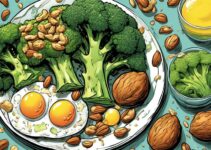Have you ever wondered if your nutrition could play a role in regulating your testosterone levels? The connection between diet and testosterone production is a topic of growing interest among researchers and health enthusiasts alike. While there's no magic food that can instantly boost your testosterone, there are specific nutritional strategies that have been shown to support healthy hormone levels. By understanding the impact of macronutrient balance, essential micronutrients, optimal fat intake, protein quality and quantity, and anti-inflammatory foods, you can optimize your diet to support your body's natural testosterone production.
Key Takeaways
- Prioritize a well-balanced macronutrient intake, including healthy fats, proteins, and carbohydrates, to optimize testosterone levels.
- Ensure adequate intake of essential micronutrients such as vitamin D, zinc, magnesium, vitamin K2, and B vitamins to support hormone regulation and testosterone production.
- Include sources of healthy fats like avocados, nuts, olive oil, and fatty fish in your diet to positively impact testosterone levels.
- Incorporate anti-inflammatory foods such as fatty fish, berries, leafy greens, nuts, and seeds to reduce inflammation and support hormonal balance.
Macronutrient Balance
To optimize your testosterone levels through nutrition, it is essential to maintain a well-balanced macronutrient intake. Hormone regulation, including testosterone production, is influenced by the intake of macronutrients such as fats, proteins, and carbohydrates. A diet rich in healthy fats, particularly monounsaturated and saturated fats, is crucial for hormone production. These fats are essential for the creation of steroid hormones, including testosterone. Incorporating sources of healthy fats like avocados, nuts, olive oil, and fatty fish can positively impact testosterone levels.
Moreover, protein plays a vital role in muscle building and hormone regulation. Amino acids, the building blocks of protein, are necessary for the synthesis of hormones, including testosterone. Ensuring an adequate intake of high-quality proteins from sources like lean meats, dairy, eggs, and legumes can support muscle growth and aid in maintaining optimal testosterone levels.
In addition to fats and proteins, carbohydrates also play a role in testosterone regulation. While low-carb diets have been associated with decreased testosterone levels, consuming an appropriate amount of carbohydrates from sources like whole grains, fruits, and vegetables can help support overall hormone balance.
Essential Micronutrients
Incorporate a variety of micronutrient-rich foods into your diet to support optimal testosterone levels and overall hormonal balance. Essential micronutrients play a crucial role in hormone regulation and can significantly impact testosterone levels. Here are some key micronutrients to focus on:
- Vitamin D Supplementation: Vitamin D is essential for testosterone production. Research suggests that low levels of vitamin D are associated with decreased testosterone levels. Consider incorporating vitamin D-rich foods such as fatty fish, egg yolks, and fortified dairy products. Additionally, getting adequate sunlight exposure or considering vitamin D supplementation can help optimize your levels.
- Zinc-Rich Foods: Zinc is a vital mineral for testosterone production and overall reproductive health. Foods high in zinc include oysters, beef, pumpkin seeds, and lentils. Ensuring sufficient intake of zinc through diet or supplementation can support healthy testosterone levels.
- Magnesium: Magnesium plays a role in regulating testosterone levels and may help improve sleep quality, which is essential for hormonal balance. Incorporate magnesium-rich foods such as spinach, almonds, and cashews into your diet.
- Vitamin K2: Vitamin K2 is involved in the regulation of testosterone and other steroid hormones. Foods rich in vitamin K2 include fermented dairy products, cheese, and natto (fermented soybeans).
- B Vitamins: B vitamins, particularly B6, B9 (folate), and B12, are important for overall hormonal balance. They can be found in foods such as leafy greens, legumes, poultry, and whole grains.
Optimal Fat Intake
Considering the crucial role of dietary fat in hormone production and overall health, prioritizing optimal fat intake can significantly impact testosterone levels and support hormonal balance. When it comes to dietary fat sources, it's important to focus on incorporating healthy fats into your diet. Sources such as avocados, nuts, seeds, olive oil, and fatty fish like salmon are rich in monounsaturated and polyunsaturated fats, which have been associated with improved testosterone levels. Additionally, including saturated fats from sources like coconut oil and grass-fed butter can also contribute to healthy hormone production.
In terms of fat metabolism, consuming an adequate amount of fat is essential for the synthesis of steroid hormones, including testosterone. Fat plays a crucial role in cholesterol synthesis, which is a precursor to testosterone production. Moreover, fat intake influences the expression of genes involved in hormone regulation, further underscoring its significance in testosterone levels.
To optimize fat intake for testosterone support, aim to consume a balanced variety of dietary fat sources. For instance, a Mediterranean-style diet rich in olive oil, nuts, and fish has been linked to favorable testosterone levels. It's also important to avoid excessive consumption of unhealthy trans fats and processed vegetable oils, as these have been associated with negative impacts on hormone levels.
Protein Quality and Quantity
Prioritizing high-quality protein sources and ensuring adequate intake is essential for optimizing testosterone levels and supporting overall hormonal function. When it comes to protein, quality and quantity both play a crucial role in enhancing testosterone levels and promoting muscle synthesis. Here are some key points to consider:
- Complete Proteins: Aim to include complete protein sources in your diet, such as lean meats, poultry, fish, eggs, and dairy products. These sources provide all the essential amino acids necessary for muscle protein synthesis and overall hormonal balance.
- Protein Timing: Distribute your protein intake evenly throughout the day, including a source of protein in each meal and snack. This approach ensures a steady supply of amino acids for muscle repair and growth, as well as for supporting testosterone production.
- Adequate Intake: Calculate your protein needs based on your body weight and activity level. In general, aim for 1.6 to 2.2 grams of protein per kilogram of body weight per day to support muscle protein synthesis and hormonal function.
- Plant-Based Options: If you follow a vegetarian or vegan diet, focus on combining different plant-based protein sources to ensure you receive all essential amino acids. Legumes, quinoa, tofu, tempeh, and edamame are excellent choices.
- Protein and Exercise: Consume a source of protein before and after resistance or strength-training workouts to support muscle recovery and synthesis. This can help optimize testosterone levels and promote muscle growth.
Ensuring both the quality and quantity of protein in your diet can significantly contribute to enhancing testosterone levels and supporting muscle synthesis.
Anti-Inflammatory Foods
To support testosterone levels and promote overall hormonal balance, integrating anti-inflammatory foods into your diet can be beneficial. Hormone regulation and gut health are closely connected, and consuming anti-inflammatory foods can help reduce inflammation, support gut health, and in turn, positively impact hormone levels.
| Anti-Inflammatory Foods | Benefits | How to Incorporate |
|---|---|---|
| Fatty Fish (e.g., salmon, sardines) | Rich in omega-3 fatty acids which help reduce inflammation and support heart health. | Enjoy grilled or baked fish as a main dish or add canned fish to salads and sandwiches. |
| Berries (e.g., strawberries, blueberries) | Packed with antioxidants that combat inflammation and oxidative stress. | Add berries to smoothies, yogurt, or oatmeal for a nutritious and flavorful boost. |
| Leafy Greens (e.g., spinach, kale) | High in vitamins, minerals, and antioxidants that help reduce inflammation and support overall health. | Incorporate leafy greens into salads, stir-fries, or smoothies for a nutrient-packed meal. |
| Nuts and Seeds (e.g., almonds, chia seeds) | Provide healthy fats and antioxidants that combat inflammation and promote heart health. | Snack on a handful of nuts or seeds, or sprinkle them on salads, yogurt, or oatmeal for added crunch and nutrition. |
Including these anti-inflammatory foods in your diet can help reduce inflammation, support gut health, and contribute to overall hormonal balance. By making these simple yet impactful dietary changes, you can potentially elevate testosterone levels and improve your overall well-being.
Frequently Asked Questions
How Does Stress Impact Testosterone Levels and What Can Be Done to Manage Stress Through Nutrition?
Stress has a significant impact on your testosterone levels by disrupting hormonal balance. To manage stress through nutrition, focus on a balanced, nutrient-rich diet with plenty of whole foods like fruits, vegetables, and lean proteins. Additionally, incorporating relaxation techniques such as deep breathing, meditation, or yoga can help reduce stress levels. Prioritizing these strategies can positively influence your overall health and well-being.
Are There Specific Foods or Supplements That Can Directly Boost Testosterone Levels?
You'll find that certain foods and supplements can directly impact testosterone levels. Nutrition plays a crucial role in managing stress and optimizing hormone balance. Foods like lean meats, eggs, and nuts are rich in essential nutrients for testosterone production. Additionally, supplements like vitamin D, zinc, and fenugreek have shown promising effects. However, it's important to consult a healthcare professional before incorporating any new supplements into your diet.
What Role Do Lifestyle Factors, Such as Sleep and Exercise, Play in Optimizing Testosterone Levels?
To optimize testosterone levels, prioritize quality sleep and regular exercise. Sleep quality directly impacts hormone production, so aim for 7-9 hours per night. Engaging in a consistent exercise routine, including both resistance and cardiovascular training, can help support healthy testosterone levels. These lifestyle factors work in conjunction with nutrition to promote overall well-being and hormone balance. It's important to focus on the holistic picture when aiming to elevate testosterone levels.
Can Certain Cooking Methods or Food Preparation Techniques Affect the Nutrient Content That Supports Testosterone Production?
When grilling techniques are used, nutrient retention can be affected, potentially impacting testosterone-supporting nutrients. Raw vs. cooked foods also play a role, as some nutrients are more readily absorbed when cooked, while others are better consumed raw. While it's important to consider nutrient retention during food preparation, focusing on a balanced diet that includes a variety of nutrient-dense foods is key for overall testosterone support.
Are There Any Potential Interactions Between Certain Foods and Medications That Could Impact Testosterone Levels?
Certain foods and medications can interact and impact testosterone levels. For example, grapefruit can affect how the body metabolizes certain medications, potentially impacting hormone levels. It's vital to be aware of these interactions and consult with a healthcare professional regarding dietary choices and medication management to optimize hormone balance. Monitoring nutrition and medication interactions can play a crucial role in maintaining healthy testosterone levels.
Conclusion
So there you have it, folks. Just load up on those essential micronutrients, balance your macronutrients, and make sure your fat intake is optimal. Don't forget to get plenty of high-quality protein and load up on those anti-inflammatory foods. It's as easy as pie! And who doesn't love pie? Elevating your testosterone levels has never been so delicious and nutritious. Keep those testosterone levels soaring high!



